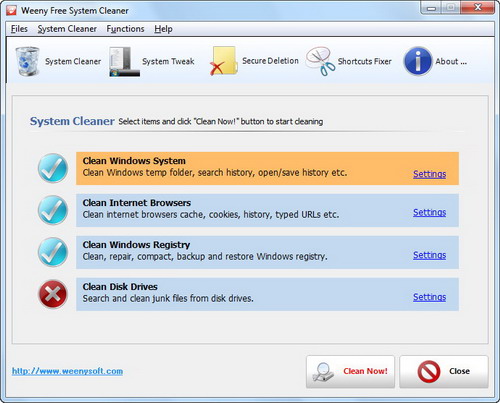Free Disk Drives Cleaner
Free Cleaner is an all-in-one free Windows system cleaner software to clean up Windows system, boost performance and prevent registry corruption.
Clean Disk Drives:
- Clean Temporary Files Generated during Program Installation - Many programs extract its installation files to a temporary directory (commonly Temp under Windows Folder) before it is installed. Sometimes if there are neglects in programming or there is something wrong with the operation system, problems occur. After installation, these temp files which are designed to be deleted automatically are not deleted as expected, and they turn to junks on the disk. They often present with the extension .tmp.
- Clean Temporary Files Generated during Program Running - Like the process of installation, programs generate some temp swap files. Some can leave files with the size up to hundreds of MB, some backup files presenting like *.old, *.bak, for example.
- Clean Left-over Files after Uninstallation - It’s really hard for Windows uninstalling system to earn compliment, plus dll (dynamic link library) being adopted by most programs, among which many are badly programmed, so it leads to the result that easy to install but extremely hard to uninstall. When these programs are uninstalled, many folders, *.dll files and many other types of unknown pinheads are left, becoming name-worthy junk files. Besides, many novice users often delete the whole program folder directly to “uninstall” it, and this certainly leave more invalid files like *.ini and *.dll. What’s more, large amount of deserted data is left in registry, causing further harm to the system.
- Clean Browser Temporary Files - Browsers download websites contents to local disks. On one hand, these cache files may help save time when access to the same website next time; on the other hand, however, they take up too much space and bring the risk of privacy disclosure to others.
- Clean Some Least Used Files - Such as some help or tutorial files for applications (commonly .hlp as extensions) and redundant font files. Since they are never used, it’s reasonable to consider them as junk files. For example, numbers of font files not only have huge sizes, but also slow down the system and some graphic processing programs.
Sponsored Links
Software Lists
